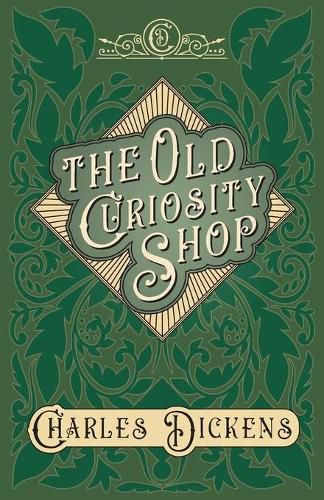Readings Newsletter
Become a Readings Member to make your shopping experience even easier.
Sign in or sign up for free!
You’re not far away from qualifying for FREE standard shipping within Australia
You’ve qualified for FREE standard shipping within Australia
The cart is loading…






This title is printed to order. This book may have been self-published. If so, we cannot guarantee the quality of the content. In the main most books will have gone through the editing process however some may not. We therefore suggest that you be aware of this before ordering this book. If in doubt check either the author or publisher’s details as we are unable to accept any returns unless they are faulty. Please contact us if you have any questions.
Originally published along with short stories in his weekly serial Master Humphrey’s Clock from 1840 to 1841, The Old Curiosity Shop tells the tale of Nell Trent and her grandfather who both live in The Old Curiosity Shop in London. In an attempt to secure Nell’s financial future, her grandfather dabbles with gambling but ends up losing it all. Convinced that Nell’s grandfather has managed to save a small fortune for her, Nell’s wastrel brother Frederick teams up with the insalubrious Quip to hunt the pair who have run away to the Midlands to live as beggars. Charles John Huffam Dickens (1812-1870) was an English writer and social critic famous for having created some of the world’s most well-known fictional characters. His works became unprecedentedly popular during his life, and today he is commonly regarded as the greatest Victorian-era novelist. Although perhaps better known for such works as Oliver Twist or A Christmas Carol , Dickens first gained success with the 1836 serial publication of The Pickwick Papers , which turned him almost overnight into an international literary celebrity thanks to his humour, satire, and astute observations concerning society and character. This classic work is being republished now in a new edition complete with an introductory chapter from Appreciations and Criticisms of the Works of Charles Dickens by G. K. Chesterton.
$9.00 standard shipping within Australia
FREE standard shipping within Australia for orders over $100.00
Express & International shipping calculated at checkout
This title is printed to order. This book may have been self-published. If so, we cannot guarantee the quality of the content. In the main most books will have gone through the editing process however some may not. We therefore suggest that you be aware of this before ordering this book. If in doubt check either the author or publisher’s details as we are unable to accept any returns unless they are faulty. Please contact us if you have any questions.
Originally published along with short stories in his weekly serial Master Humphrey’s Clock from 1840 to 1841, The Old Curiosity Shop tells the tale of Nell Trent and her grandfather who both live in The Old Curiosity Shop in London. In an attempt to secure Nell’s financial future, her grandfather dabbles with gambling but ends up losing it all. Convinced that Nell’s grandfather has managed to save a small fortune for her, Nell’s wastrel brother Frederick teams up with the insalubrious Quip to hunt the pair who have run away to the Midlands to live as beggars. Charles John Huffam Dickens (1812-1870) was an English writer and social critic famous for having created some of the world’s most well-known fictional characters. His works became unprecedentedly popular during his life, and today he is commonly regarded as the greatest Victorian-era novelist. Although perhaps better known for such works as Oliver Twist or A Christmas Carol , Dickens first gained success with the 1836 serial publication of The Pickwick Papers , which turned him almost overnight into an international literary celebrity thanks to his humour, satire, and astute observations concerning society and character. This classic work is being republished now in a new edition complete with an introductory chapter from Appreciations and Criticisms of the Works of Charles Dickens by G. K. Chesterton.